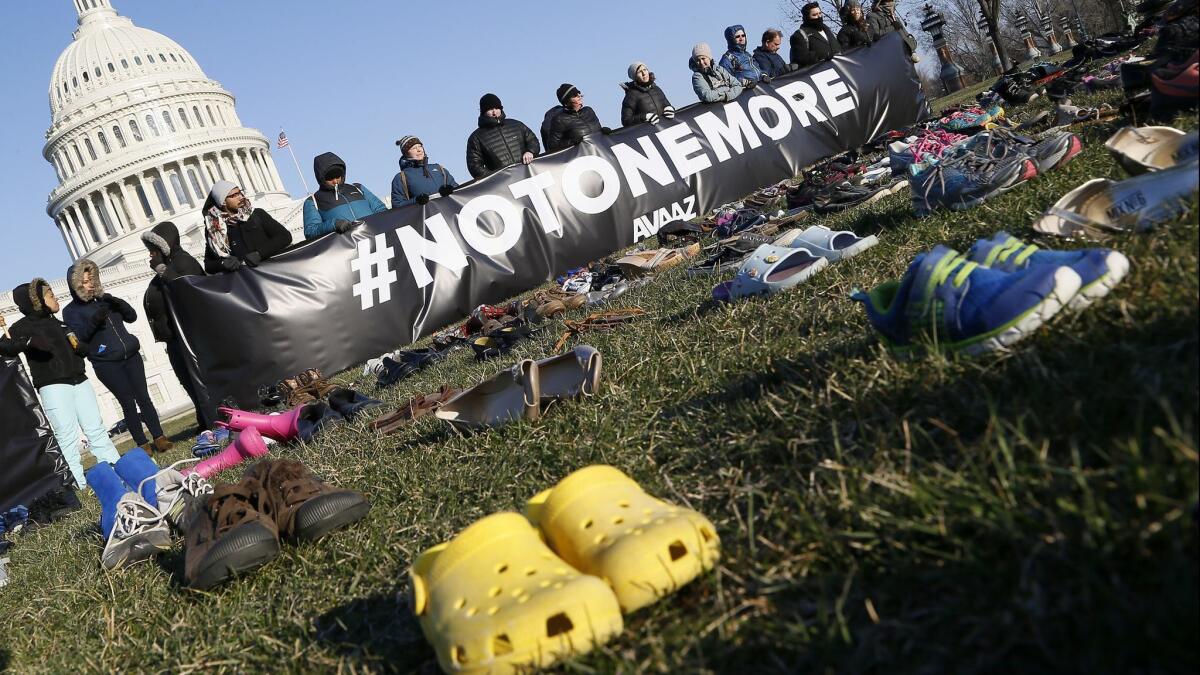Op-Ed: The ‘adults in the room’ now are the kids marching in the streets

- Share via
They’re self-absorbed, consumeristic, politically disconnected, addicted to spouting their opinions on Facebook, and never show up when it counts. They seem unable to complete the most basic, practical tasks.
Adults really are ruining America.
Of course, that’s not how they frame it. They point to young people as the ones unable to get it together, and to some degree that message has gotten internalized. If you follow people under the age of 30 on Instagram, you’re familiar with “adulting,” the catch-all hashtag applied to doing anything from following a recipe (rather than eating Doritos for dinner) to knowing what a 401(k) is (even though you can’t afford to contribute to it). T-shirts and tote bags warn the world, “I can’t adult today.”
But there are aspects of adulthood that young people should resist. This is the lesson that the student movement for gun control is teaching the country right now. On Saturday, teenagers who survived the mass shooting at Marjory Stoneman Douglas High School in Parkland, Fla., will lead thousands into the streets to show they are fed up with preventable gun violence like school shootings. The March For Our Lives, according to the protest’s website, “is created by, inspired by, and led by students across the country who will no longer risk their lives waiting for someone else to take action.”
The message is clear: You grown-ups have failed us.
Adulting, in this context, isn’t about paying bills on time. It’s passively accepting the status quo, or actively protecting yourself at the expense of others. These shameful activities are the hallmarks of those who consider themselves one of “the adults in the room,” to use a well-worn phrase that’s become popular in the Trump era.
In practice, the most powerful adults are adept at blaming others for their failures — and teenagers see right through them.
If you ask these adults, it’s a problem that kids don’t want to emulate them. “To a growing number of young Americans, acting like a grown-up is a kind of role-playing that can be thought of as a joke,” writes Sen. Ben Sasse (R-Neb.) in his book, “The Vanishing American Adult: Our Coming-of-Age Crisis.” “Our kids simply don’t know what an adult is anymore — or how to become one.”
To the contrary, our kids know exactly what an adult is. And it’s laudable that they are striving to avoid turning into one.
Let’s look at what the self-proclaimed “adults in the room” have been up to. Sasse has received lots of press for his criticism of the president, but 95% of his votes have aligned with Trump’s agenda. Endorsed by the National Rifle Assn., Sasse also voted for a recent bill purporting to increase school security that, in fact, contained no gun control measures. He and his fellow adults in Congress enjoy excellent health insurance, retirement benefits and metal detectors at every entrance of their workplace while failing to extend these practical protections to all other Americans.
Then there’s the purported adult in the White House, who responded to the Parkland shooting by echoing the NRA’s call to arm schoolteachers. He posts more cruel tweets than even the most petulant teen, and most of the adults in his party refuse to stand up to him about it. The ex-CEOs and military men tasked with keeping POTUS in check keep falling down on the job too.
Sure, adults know how to practice the ancient art of balancing a checkbook, but as they accrue political power and social status, they tend to become inert in the face of violence, lies and injustice. Historically, it’s young people who have been at the forefront of antiwar efforts, the civil rights movement and countless other collective actions to make America a better place for those who have been pushed to the margins. In theory, adulting is all about accepting responsibility. In practice, the most powerful adults are adept at blaming others for their failures — and teenagers see right through them.
In a speech at a gun control rally in Fort Lauderdale, Fla., that quickly circulated on social media, March For Our Lives organizer Emma Gonzalez decried companies for “trying to make caricatures of the teenagers these days, saying that all we are [is] self-involved and trend-obsessed” — in other words, insufficiently adulting. She continued: “They hush us into submission when our message doesn’t reach the ears of the nation. We are prepared to call BS.” She went on to call BS on a range of adults, including Congress, the NRA and constituents who haven’t demanded action on this issue.
On Saturday, young people will march with Gonzalez to say this is not acceptable. I hope that the older generations who join in will do more than hold signs; they have to do the work. Because if their definition of adulting doesn’t include action and accountability, they can’t blame young people for not wanting to join their ranks.
Ann Friedman is a contributing writer to Opinion.
Follow the Opinion section on Twitter @latimesopinion and Facebook
More to Read
A cure for the common opinion
Get thought-provoking perspectives with our weekly newsletter.
You may occasionally receive promotional content from the Los Angeles Times.






